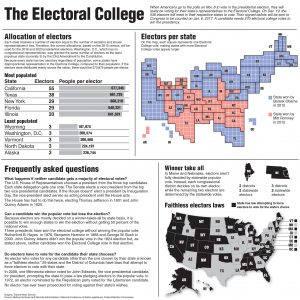
Established in Article II section 1 of the Constitution of the United States of America, the founding fathers formed the Electoral College to elect the president and vice-president of the U.S. They constructed the system as a compromise between the popular vote of qualified citizens and the direct vote of Congressional leaders. However, some dispute the framers’ ingenuity.
Each state (and the District of Columbia) receives a number of electors based on the amount of representatives in the House and Senate. Every state holds two senators and a minimum of one congressional district. Congressional districts, based on population, decide the number of representatives each state renders. For example, Florida maintains 27 congressional districts and thus, secures 29 electoral votes.
Although the process varies from state to state, political parties nominate electors at state conventions. If a citizen votes for the Democratic candidate, he actually votes for an elector who pledged to vote for that candidate.
Electoral College Proves Fairness
According to Tara Ross, author, lawyer and Electoral College expert for Prager University, the Electoral College encourages national-campaigning. In other words, it gives a voice to both large and small states. As the system stands today, presidential candidates find no incentive to poll large margins in any one state. Winning 50.1 percent of the votes in a state proves as effective as winning 100 percent of the votes. Therefore, the candidates tour the nation and campaign in every state, to enable them to win a majority of states’ electoral votes, as writes the Heritage Foundation.
Though commonly referred to as a democracy, the United States actually governs itself as a republic. In a democracy, citizens decide policy matters directly, through voting on ballots. However, in a republic, citizens choose representatives who, in turn, make policy decisions on their behalf.
The Framers of the Constitution feared a pure democracy. James Madison, author of the Federalist Papers, wrote in 1787 that pure democracies “have ever been spectacles of turbulence and contention; have ever been found incompatible with personal security or the rights of property; and have in general been as short in their lives as they have been violent in their deaths” (Federalist No. 10). His words mean that direct democracies, where majorities rule, overlook individual rights.
Dismantling the Electoral College will take away the purpose of the Senate and the states. A purely popular election led to concerns among the Founders that larger states would dominate the election. The system gives more influence to the states with more votes, but also prevents them from dominating the other smaller states. Smaller states can influence an election.
While opponents of the electoral college argue the risk of electing “faithless electors,” or an elector who pledges to vote for one candidate, but votes for another. However, only seven incidents of this occurred in the century. Faithless electors never changed election results because their purpose serves to make a statement rather than make a difference. Also, they find concern in the depressing voter turnout risk. They worry that with electoral votes, voters will find incentive to discourage participation. The argument fails to account for the multiple elections that occur, statewide, as well. Adversaries believe the National Popular vote acts as an alternative to the Electoral College. According to Tara Ross, the National Popular Vote asks states to sign a contract to give their presidential electors to the winner of the national popular vote instead of the winner of the state’s popular vote.
The Founding Fathers created a strong system, the Electoral College, that one should not overlook. The Electoral College encourages national-campaigning and stays true to a republic style of government. The National Popular Vote will destroy state autonomy.
